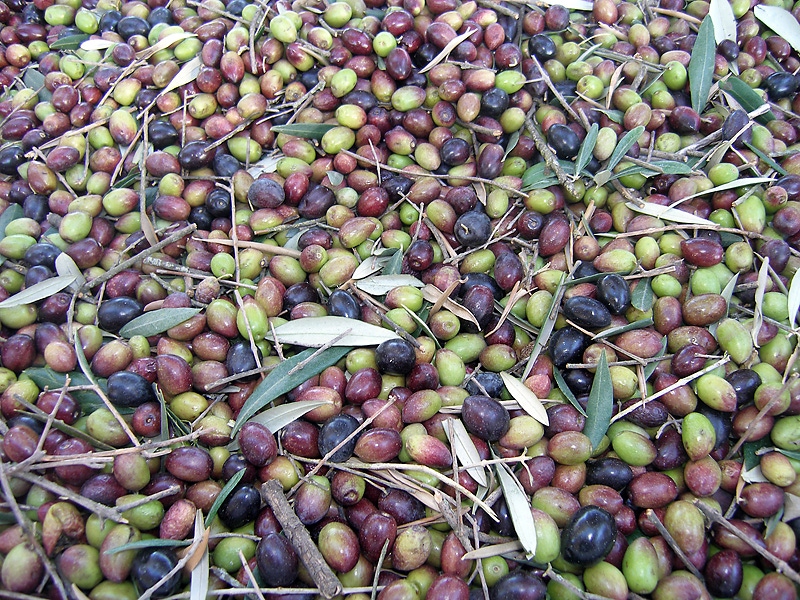February 8, 2016

Richard Williams unfurls his long, sturdy frame from a tractor and begins a stroll through 20 acres of olive groves at his farm in Volusia County, Florida. His in-laws, the Ford/Veech family, have spent six generations farming in Florida and have a more than 50-year-old citrus grove.
Williams checks the leaf structure to see which of the 11,160 olive trees are giving fruit. He has a lot riding on the Florida Olive Systems, Inc., project that is being funded by the Ford/Veech family.
After conducting his own research on the viability of growing olives in Florida, Williams visited Texas, Georgia and California, which have a history of growing high-density olives. Also, he and other growers invited experts from Italy, Spain and Greece to visit Florida and discuss the olive industry.
In 2012, Williams planted 20 acres of Arbequina, Arbosana, and Koroneiki varieties of olives. He also has 16 varieties of olive trees under observation, planted in approximately 6,000 containers. Williams has additional varieties coming in to evaluate this spring.
“Planting olives is not for the faint of heart by any stretch of the imagination. This is so new that we are learning every day,” said Williams, whose wife Lisa helps run Florida Olive Systems, Inc. “But it’s a new opportunity to reinvent ourselves after catastrophic losses to citrus greening.”
Williams’s in-laws have grown citrus for decades, part of the $10.7 billion industry that has helped define Florida as the Sunshine State. Yet, the onset of citrus greening disease decimated farms throughout the state, causing approximately $7.8 billion in lost revenue, 162,200 citrus acres and 7,513 jobs since 2007, according to researchers with the University of Florida Institute for Food and Agricultural Sciences.
“I looked at consumption the United States, and we are the number three consumers of olive oil in the world,” Williams said. “But I also thought, ‘Can I really compete with the Italians and Greeks who have been producing olive oil for thousands of years?’ That was the same thinking on blueberries and now Florida has a thriving blueberry industry.”
Williams has the right idea, said Jennifer Gillett-Kaufman, a UF/IFAS entomology professor who is leading the study of olive production in Florida. “Imagine buying extra virgin olive oil from olives grown in Florida. That may soon become a reality as we explore olives as a new crop in the state,” she said.
University of Florida lends needed support
In 1995, Americans consumed 22 million gallons of olive oil; currently we consume approximately 80 million gallons of olive oil and that number is growing, Gillett-Kaufman said. “There is a huge increase and it’s just going up because of the health benefits,” she said.
The research by UF/IFAS faculty includes a workshop held last year with olive experts from California. Gillett-Kaufman and a team of scientist have access to five planted olive groves established by the Florida Olive Council at five UF/IFAS Research and Education Centers where they are exploring different varieties.
Gillett-Kaufman is researching pests and looking for insect vectored diseases, while Mack Thetford, of the West Florida REC in Jay, Florida, explores the horticulture data to grow and harvest olives. The team is working with researchers in Georgia and Texas, and the U.S. Department of Agriculture to determine if olives will be a viable crop in Florida.
Florida farmers formed the Florida Olive Council 10 years ago to promote olive crops in the state. Currently, there are 300 acres of olive trees in the state managed by approximately 50 growers, said Florida Olive Council President Michael O’Hara Garcia. “We are really enthusiastic that the University of Florida has taken a leading role,” said he said. “We have 200 members in the council, because farmers are becoming excited that the university is lending its scientific support.”
Also, growers see other benefits to growing olives, said Williams, who works closely with UF/IFAS researchers to spread knowledge to other farmers. “Olives use a third of what citrus uses on water and half of the nutrients and fertilizer,” he said.
So far, the oil that Williams and other farmers have produced have garnered excitement. “The extra virgin olive oil that we produce has been independently tested and shown to contain some exciting anti-inflammatory properties that are apparently not found in all olive oils sold,” he said. “We want to responsibly study this, let people come in and see what we are doing. We need more people to plant responsibly, put out test groves and use the University of Florida to provide the science and other assistance.”
You May Also Like




